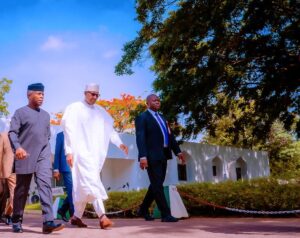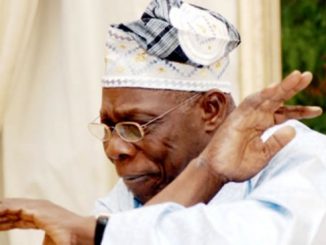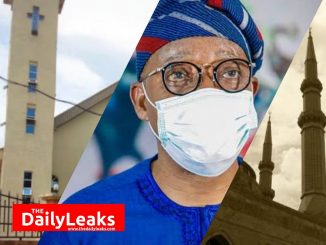
By Seyi Gesinde
The news has already travelled like wildfire that President Muhammadu Buhari has signed into law the National Social Investment Programme Agency which Vice President Yemi Osinbajo, SAN, initially made to happen in 2016.
 President Buhari on Monday, May 23, 2023, signed the bill into law alongside seven others passed by the National Assembly, one of which is the one establishing the National Senior Secondary Education Commission, another ranking one catering to the educational demands of young Nigerians. But what makes the National Social Investment Programme Agency Bill unique is the fact that it meets the social welfare demands of all categories of Nigerians.
President Buhari on Monday, May 23, 2023, signed the bill into law alongside seven others passed by the National Assembly, one of which is the one establishing the National Senior Secondary Education Commission, another ranking one catering to the educational demands of young Nigerians. But what makes the National Social Investment Programme Agency Bill unique is the fact that it meets the social welfare demands of all categories of Nigerians.
Before the initiative became law on Monday, the President had, in November 2022, written to the National Assembly, requesting the passage of the Executive Bill. It was on the strength of this presidential recommendation that the Senate and House of Representatives worked on it and subsequently transmitted it to the President.
Recalled the Federal government created the National Social Investment Programme (NSIP) in 2016, as facilitated and anchored by the Office of the Vice President under the watch of Prof Osinbajo to solve the problems of poverty and hunger across Nigeria.
 As an elaborate welfare initiative, the programmes under the NSIP were designed to ensure a more equitable distribution of resources to vulnerable populations, including children, youth and women. Since 2016, all the programmes put together under the NSIP initiative according to available data have supported more than four million beneficiaries nationwide through a fair and transparent process supported by the Ministry of Budget and National Planning (MBNP) and other notable Ministries, Departments and Agencies (MDAs) with aligned goals.
As an elaborate welfare initiative, the programmes under the NSIP were designed to ensure a more equitable distribution of resources to vulnerable populations, including children, youth and women. Since 2016, all the programmes put together under the NSIP initiative according to available data have supported more than four million beneficiaries nationwide through a fair and transparent process supported by the Ministry of Budget and National Planning (MBNP) and other notable Ministries, Departments and Agencies (MDAs) with aligned goals.
Other social welfare programmes packaged under the NSIP include:
• The N-power programme is one designed to assist young Nigerians between the ages of 18 to 35 in acquiring and developing life-long skills for becoming change-makers in their communities and players in the domestic and global markets and given a stipend of N30,000 monthly.
• The Conditional Cash Transfer (CCT) programme is an initiative which directly supports those within the lowest poverty bracket by improving nutrition, increasing household consumption and supporting the development of human capital through cash benefits to various categories of the poor and vulnerable. As planned, the support is, however, conditioned on fulfilling soft and hard co-responsibilities that enable recipients to improve their standard of living.
• Government Enterprise and Empowerment Programme (GEEP) is a micro-lending intervention that targets traders, artisans, enterprising youth, farmers and women in particular, by providing loans between 10,000 and 100,000 at no monthly cost to beneficiaries.
• The Home Grown School Feeding Programme (HGSF) aims to deliver school feeding to young children with a specific focus on increasing school enrollment, reducing the incidence of malnutrition (especially among the poor and those ordinarily unable to eat a meal-a-day), empowering community women as cooks and by supporting small farmers that help stimulate economic growth.
ALSO READ: NSIP: Africa’s largest social investment programme under Osinbajo
As highlighted, NSIP known to be Africa’s largest social investment programme initiated by Prof Osinbajo and packaged for the Federal Government to benefit Nigerians, if well structured and institutionalised — as these are part of what signing the bill into law aims to achieve, will enjoy sustainable progression with the realisable potential of eradicating poverty and illiteracy of all sorts among the citizenry, and thereby pave the way for their overall growth, fulfilling the goal of Nigeria’s National Development Plan.
It is worth mentioning that the ambition of the Buhari administration of turning Nigeria into a welfare state has just been fully birthed with the signing into law of this now institutionalised national welfare scheme with which the National Social Investment Programme Agency can safely be called for the richness in the needs it is meant to cater to.
Similarly, the quality of working relationships between the President and the Vice President under the current administration is worth commending as it has helped in heightening the number of deliverables already churned out for the benefit of the populace in the eight-year Buhari-Osinbajo government. This why in a day, eight bills focusing on the improvement of lives of Nigeria across different divides and interests can be signed into law.
Reflecting on other proposed legislation signed into law, in compliance with the provisions of the Acts Authentication Act Cap. A2, Laws of the Federation of Nigeria 2004, as earlier informed by the Senior Special Assistant to the President on National Assembly Matters, Senate, Senator Babajide Omoworare, in a statement, for instance, by signing its establishment bill into law, the National Senior Secondary Education Act now establishes a Commission, prescribes minimum standards for senior secondary education in Nigeria and the management of National Senior Secondary Education Fund. This is what a nation ordinarily needs for growth. A country aiming to develop needs a literate youthful audience.
Likewise, the Chartered Institute of Power Engineers of Nigeria Act which establishes the Chartered Institute of Power Engineers of Nigeria is charged with the responsibility for determining the standard of knowledge and skill to be attained by persons seeking to become chartered power engineers. This solves the problems of growth in this sector too, as now, there would be quality assurance in the calibre of people managing both the local and national power needs.
Similarly, the President also assented to the Federal University of Health Sciences Ila-Orangun (Establishment) Act, the Federal University of Health Sciences, Azare (Establishment) Act, the Chartered Institute of Development Studies and Administration of Nigeria (Establishment) Act, the Federal Institute of Industrial Research (Establishment) Act, and the Institute of Strategic Management of Nigeria Act, respectively.
All these are pointers to the fact that Nigeria is now appearing to be a nation that puts professionalism above quackery in both the public and private sectors of the economy. It shows the country is not static but has progressed than the present administration met it eight years ago irrespective of the current national issues.
Then, on a lighter but serious note, one of the strong legacies the Buhari-Osinbajo administration is leaving behind now is the finesse it has brought to governance with the quality of relationships between the President and Vice President, aiding national growth in the pattern Nigeria has not witnessed in 23 years of this democratic dispensation. This is what the incoming administration should build on to further stabilise governmental proceedings as it is believed that a person must make peace with oneself before they will find peace enough to make the world better for others to live in.




